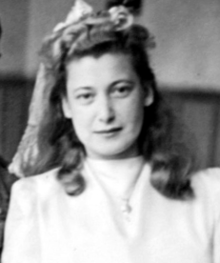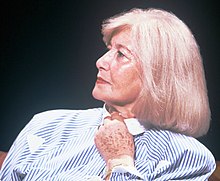| Revision as of 18:27, 3 October 2018 editIfny (talk | contribs)Extended confirmed users1,043 edits added wedding photo link, Rabbi Leslie Harman wedding officiator info, Jewish links, linkified parachute, clarified/corrected ghetto timeline, added names for siblings, death march details← Previous edit | Revision as of 21:14, 3 October 2018 edit undoAnomieBOT (talk | contribs)Bots6,559,708 edits Fixing reference errorsNext edit → | ||
| Line 36: | Line 36: | ||
| ==Early life and the Holocaust== | ==Early life and the Holocaust== | ||
| Turgel was born in Krakow in 1923, the youngest of nine children of Samuel and Estera Goldfinger.<ref name= |
Turgel was born in Krakow in 1923, the youngest of nine children of Samuel and Estera Goldfinger.<ref name="Genzlinger">] (13 June 2018). "". '']''. nytimes.com. Retrieved 2018-06-15. Print version, 14 June 2018, p. B15.</ref> Her parents ran a small textile business.<ref name="Genzlinger"/> After the death of her father, during her childhood, her mother carried on the family business.<ref name="Genzlinger"/> When the ] invaded Poland in 1939, her family was ordered to give up all their belongings. Turgel, several siblings and her mother were forced to move to the ] in August 1941.<ref name="independentarticle"/><ref name=het>{{cite web|url=https://www.het.org.uk/survivors-gena-turgel|archive-url= https://web.archive.org/web/20170805143019/https://www.het.org.uk/survivors-gena-turgel |archive-date=5 August 2017 |publisher=]. het.org.uk |title=Gena Turgel MBE}}</ref> | ||
| Her brother Willek was shot and killed by the ] through the window of their home while he stood on a chair beside the window to reach a suitcase on top of a wardrobe.<ref name=het/><ref name="independentarticle"/> Another brother, Janek, escaped and Turgel never saw him after that.<ref name=het/> On March 1st 1942, Gena, her mother, and her sisters Miriam and Hela were sent to the ]. Turgel's sister Miriam and her husband were shot after being caught trying to smuggle food into the camp.<ref name="independentarticle"/> | Her brother Willek was shot and killed by the ] through the window of their home while he stood on a chair beside the window to reach a suitcase on top of a wardrobe.<ref name=het/><ref name="independentarticle"/> Another brother, Janek, escaped and Turgel never saw him after that.<ref name=het/> On March 1st 1942, Gena, her mother, and her sisters Miriam and Hela were sent to the ]. Turgel's sister Miriam and her husband were shot after being caught trying to smuggle food into the camp.<ref name="independentarticle"/> | ||
| Line 51: | Line 51: | ||
| == Death == | == Death == | ||
| She died on 7 June 2018, at the age of 95 in England. <ref name="sherwood1" /> Upon news of her death, Britain's chief rabbi, ], called her a "truly remarkable Holocaust Survivor", and said: "Her legacy is our responsibility now."<ref name= |
She died on 7 June 2018, at the age of 95 in England. <ref name="sherwood1" /> Upon news of her death, Britain's chief rabbi, ], called her a "truly remarkable Holocaust Survivor", and said: "Her legacy is our responsibility now."<ref name="CNN"/> | ||
| ==References== | ==References== | ||
Revision as of 21:14, 3 October 2018
| Gena Turgel | |
|---|---|
 fair use image fair use image | |
| Born | Gena Goldfinger (1923-02-01)1 February 1923 Kraków, Poland |
| Died | 7 June 2018(2018-06-07) (aged 95) |
| Occupation | Author, educator |
| Language | English, Polish |
| Period | 1987–2018 |
| Genre | Memoir, essay |
| Notable works | I Light a Candle |
| Spouse | Norman Turgel (m. 1945) |
| Children | 3 |
| Relatives | Miriam Goldfinger, Janek Goldfinger, Hela Goldfinger, Willek Goldfinger |
Gena Turgel (née Goldfinger; 1 February 1923 – 7 June 2018) was a Jewish Polish author, educator, and Holocaust survivor.
Early life and the Holocaust
Turgel was born in Krakow in 1923, the youngest of nine children of Samuel and Estera Goldfinger. Her parents ran a small textile business. After the death of her father, during her childhood, her mother carried on the family business. When the Nazis invaded Poland in 1939, her family was ordered to give up all their belongings. Turgel, several siblings and her mother were forced to move to the Krakow ghetto in August 1941.
Her brother Willek was shot and killed by the SS through the window of their home while he stood on a chair beside the window to reach a suitcase on top of a wardrobe. Another brother, Janek, escaped and Turgel never saw him after that. On March 1st 1942, Gena, her mother, and her sisters Miriam and Hela were sent to the Kraków-Płaszów concentration camp. Turgel's sister Miriam and her husband were shot after being caught trying to smuggle food into the camp.
Gena, Estela, and Hela were then part of the last forced march from Płaszów to Auschwitz-Birkenau in December 1944. Months later she was part of the "death march" to Buchenwald before finally being sent to the Bergen-Belsen camp.
She survived the bombing of Poland and the Bergen-Belsen concentration camp, where she nursed a dying Anne Frank.
Personal life

She married a British soldier, Norman Turgel, after the liberation of Bergen-Belsen and the British press called her "the Bride of Belsen." The ceremony was officiated by Jewish British Army chaplain Padre Capt. Leslie Henry Hardman Her wedding dress, made from a British army parachute, is an exhibit in the Imperial War Museum in London. Norman held a party to celebrate his engagement to Gena at Belsen having been granted permission to do so by Major Leonard Berney, the commander of the Bergen-Belsen Displaced Persons Camp (as it was then called).
Her memoir, I Light a Candle, was published in 1987. She spent much of her life educating British school pupils about the Holocaust.
Death
She died on 7 June 2018, at the age of 95 in England. Upon news of her death, Britain's chief rabbi, Ephraim Mirvis, called her a "truly remarkable Holocaust Survivor", and said: "Her legacy is our responsibility now."
References
- ^ Lambert, Angela (13 April 1995). "From out of the horror, a love story". The Independent. independent.co.uk. Retrieved 3 October 2018.
{{cite web}}: Italic or bold markup not allowed in:|publisher=(help) - "Heartfelt tributes to Gena Turgel: 'A shining light has gone out and will never be replaced'".
- ^ Genzlinger, Neil (13 June 2018). "Gena Turgel, Holocaust Survivor With a Love Story, Dies at 95". New York Times. nytimes.com. Retrieved 2018-06-15. Print version, 14 June 2018, p. B15.
- ^ "Gena Turgel MBE". Holocaust Educational Trust. het.org.uk. Archived from the original on 5 August 2017.
- ^ Diaz, Andrea (11 June 2018). "Holocaust survivor who treated Anne Frank in a concentration camp is dead at 95". CNN. cnn.com. Retrieved 2018-06-12.
{{cite news}}: Italic or bold markup not allowed in:|work=(help) - ^ Sherwood, Harriet (8 June 2018). "Gena Turgel, Holocaust survivor known as Bride of Belsen, dies". The Guardian. theguardian.com.
{{cite web}}: Italic or bold markup not allowed in:|website=(help) - "The Bride of Belsen: A love story born amidst the horror".
- "Leslie Hardman was one of the first to enter Belsen concentration camp". Wales Online. 22 October 2008. Retrieved 3 October 2018.
- "dress, wedding, parachute silk, Belsen". Imperial War Museums.
- Kirkova, Deni. "Against all odds: How British soldier sent to liberate Belsen camp fell in love with Jewish inmate... thanks to the kindness of an army major". Mail Online.
- Morris, James. "Holocaust memorial: Gena Turgel tells Islington pupils 'it's my duty to tell survival story'".